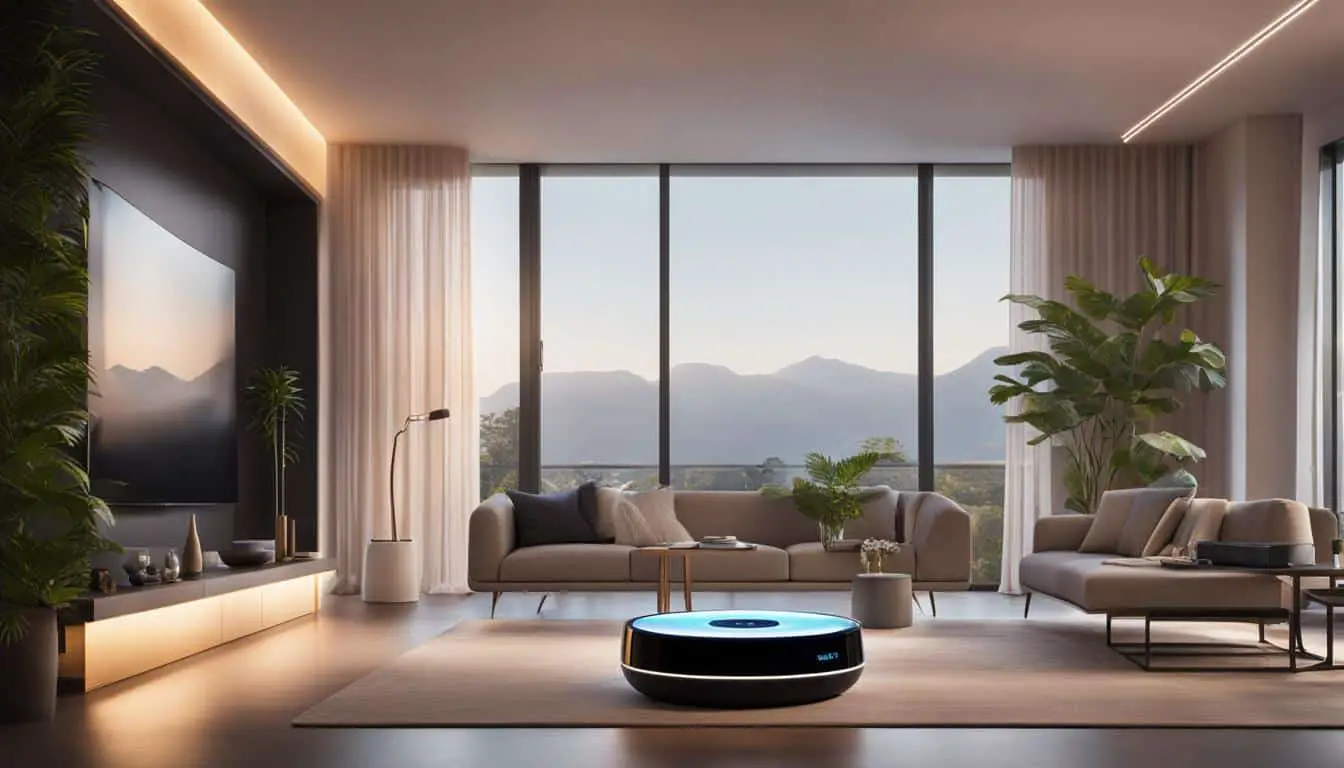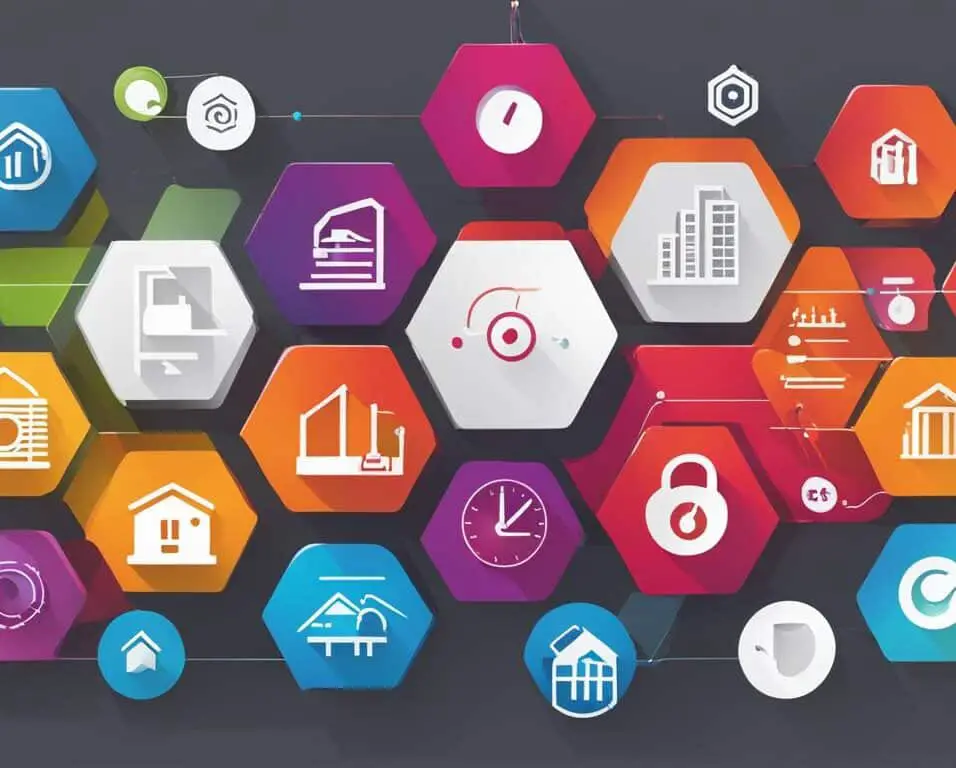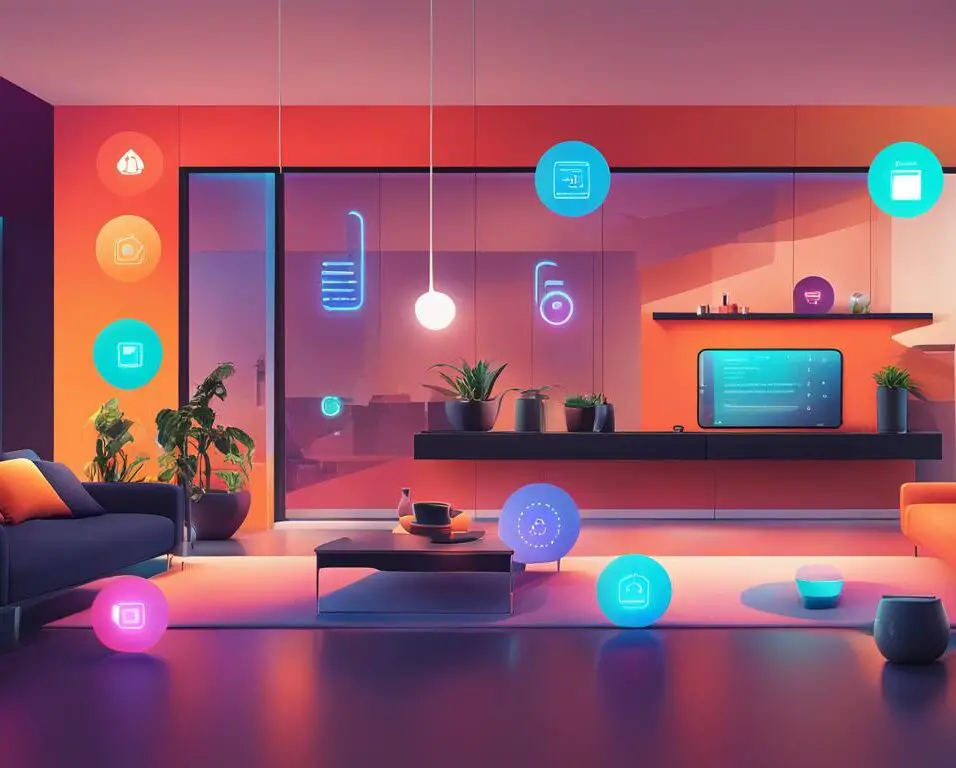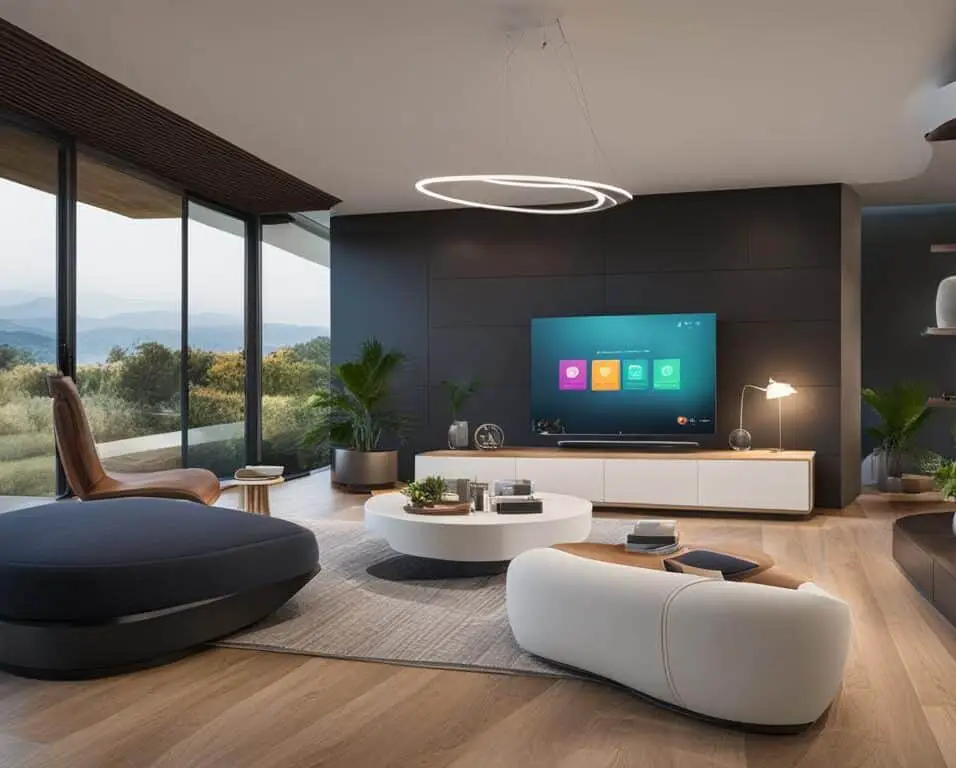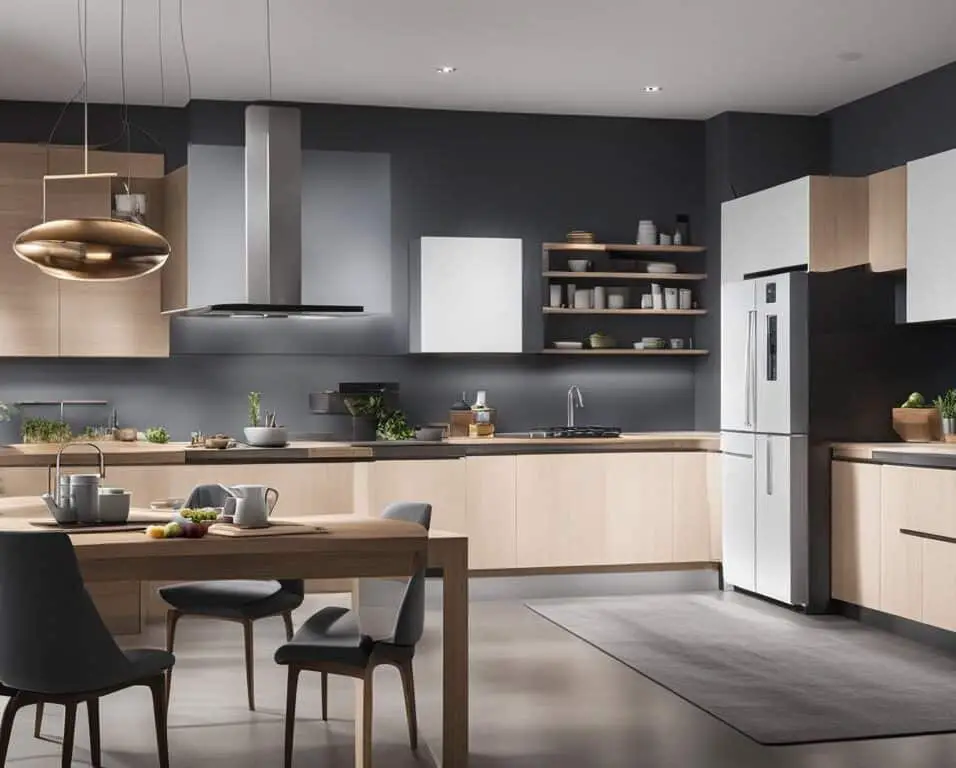AI Innovations in Home Automation Systems
Smart home automation has revolutionized the way we interact with our living spaces. With the integration of AI technologies, our homes have become more convenient, secure, and energy-efficient. AI algorithms adapt and learn to our preferences, creating personalized and customized environments tailored to our needs.
The global smart home market is projected to reach 53.45 billion U.S. dollars by 2022, with a CAGR of 33.7% for AI-driven home systems. The rapid adoption and high incomes in North America have led the region to lead the market.
Key Takeaways:
- Smart home automation integrates AI technologies, making homes more convenient, secure, and energy-efficient.
- AI algorithms adapt and personalize living spaces to individual preferences.
- The global smart home market is projected to reach 53.45 billion U.S. dollars by 2022.
- North America leads the smart home market in terms of adoption and high incomes.
- AI innovations in home automation systems enhance the overall quality of life for homeowners.
AI-powered smart home automation is transforming our homes, providing us with greater efficiency and convenience. As technology continues to advance, the future of smart home automation holds even more potential, with healthcare integration, smart appliances, and improved voice recognition technology on the horizon. Embracing this technological revolution ensures a comfortable, efficient, and secure living space that caters to our individual needs and enhances our overall quality of life.
What is Smart Home Automation?
Smart home automation refers to the integration of devices and advanced technologies into a house to improve convenience, comfort, efficiency, and security. The key is to connect various devices, systems, and appliances to a central hub, which can be accessed via a smartphone, voice command, or other means. This interconnected network allows homeowners to automate and remotely manage tasks such as adjusting room temperature, controlling lighting, monitoring security, and optimizing energy usage. Artificial intelligence (AI) plays a crucial role in smart home automation, enabling devices to adapt and learn from users’ preferences, simplifying daily routines, and improving the overall quality of life.
Imagine waking up in the morning, and with a single voice command, your bedroom lights turn on, the thermostat adjusts to your desired temperature, and your favorite playlist starts playing in perfect synchrony. Throughout the day, your home adapts to your needs, intelligently adjusting lighting and temperature based on your preferences and occupancy. When you leave for work, your security system is armed automatically, and you receive notifications if any unusual activity is detected. And when you return home, the doors unlock, the lights turn on, and your home creates a warm and inviting ambiance to welcome you back.
Smart home automation takes convenience to the next level, offering a seamless integration of devices and technologies that simplify daily routines and enhance comfort. By connecting all your smart devices to a central hub, you can control and automate various aspects of your home with ease. Whether it’s managing lights, thermostats, appliances, security systems, or even entertainment systems, smart home automation provides unparalleled convenience at your fingertips.
Moreover, smart home automation enhances energy efficiency, allowing you to optimize energy usage and reduce utility bills. With intelligent lighting systems, you can program lights to turn on and off automatically based on occupancy or daylight availability. Smart thermostats intelligently learn your temperature preferences and adjust settings accordingly, helping you save energy without compromising comfort. By using AI algorithms, smart home automation constantly adapts and learns from your habits, ensuring that your home is always working in harmony with your lifestyle.
Of course, security is a paramount concern for homeowners, and smart home automation provides advanced security features to protect your property and loved ones. With smart cameras, door locks, and motion sensors, you can monitor your home remotely, receive alerts in case of suspicious activity, and even grant access to visitors remotely. Smart security systems integrate seamlessly into the overall automation network, enhancing both convenience and peace of mind.
To summarize, smart home automation revolutionizes the way we interact with our homes. It delivers unmatched convenience, comfort, efficiency, and security by integrating devices and technologies into a cohesive system that can be easily controlled and managed. With AI at the core, smart homes adapt and learn from our preferences, simplifying our daily routines and improving our quality of life. Whether it’s managing lighting, temperature, security, or energy usage, smart home automation offers a seamless and intelligent solution that enhances the way we live.
Most Popular AI Apps in Smart Home Automation
When it comes to smart home automation, there are several AI apps that have gained significant popularity and are widely adopted by users. These apps offer a range of features and functionalities to control and automate smart devices in the home, making everyday life more convenient and efficient. Let’s explore some of the most popular AI apps in smart home automation:
- Amazon Alexa: With its voice-controlled assistant, Amazon Alexa allows users to control smart devices, play music, and access information through voice commands.
- Google Assistant: Google Assistant offers similar features to Amazon Alexa, providing voice-controlled access to smart devices and other digital services.
- Apple HomeKit: Apple HomeKit enables users to control their smart home devices through their Apple devices, such as iPhones, iPads, and Apple Watches.
- Samsung SmartThings: Samsung SmartThings is a popular app that integrates various smart home devices, allowing users to control and automate their home environment.
- Philips Hue: Philips Hue focuses on lighting automation, allowing users to control and customize their lighting settings through the app.
- Nest (now Google Nest): Nest offers a range of smart home products, including thermostats, cameras, and doorbells, all controlled through the Nest app.
- Ring: Ring specializes in smart security products, such as video doorbells and security cameras, providing users with remote access and monitoring capabilities.
- Ecobee: Ecobee offers smart thermostats that help optimize energy usage and provide personalized comfort settings.
- Tuya Smart: Tuya Smart is an AI app that supports a wide range of smart home devices, allowing users to control and manage their devices effortlessly.

These AI apps have revolutionized the way we interact with our smart homes, giving us complete control and customization at our fingertips. Whether it’s managing lighting, adjusting the thermostat, or enhancing security, these apps provide seamless integration and functionality. Amazon Alexa and Google Assistant, in particular, have gained immense popularity and have become household names in the smart home industry. With high user ratings and availability on both iOS and Android platforms, these apps continue to dominate the market.
10 AI Use Cases in Smart Home Automation – Real Examples
Smart home automation powered by AI technology offers a wide range of practical applications that enhance our daily lives. Here are ten real-life examples of how AI is transforming our homes and improving various aspects of home living.
Voice Assistants for Control and Automation
Integrating voice assistants like Amazon Alexa and Google Assistant into smart home devices allows users to control and automate their home systems through voice commands. Whether it’s adjusting the lighting, playing music, or setting the temperature, voice assistants make it effortless and convenient.
Energy Management and Optimization
The Nest Learning Thermostat is an AI-powered device that learns the homeowners’ behavior, preferences, and schedules to optimize energy usage. By automatically adjusting the temperature based on occupancy patterns, the Nest Learning Thermostat helps reduce energy consumption and lower utility bills.
Security and Surveillance
Smart home security systems, such as the Ring Video Doorbell and Nest Cam, leverage AI to enhance home security and surveillance. With features like motion detection, facial recognition, and real-time alerts, these devices provide homeowners with peace of mind and a sense of security.
Predictive Maintenance
Whirlpool Smart Appliances utilize AI algorithms to monitor and analyze appliance performance and usage patterns. By detecting potential issues before they become major problems, these appliances can perform self-maintenance or alert homeowners to schedule repairs, ensuring optimal appliance functionality.
Personal Lighting and Ambience Control
The Philips Hue lighting system allows users to create personalized lighting scenes, adjust color temperatures, and control lighting remotely through voice commands or smartphone apps. With AI technology, homeowners can create the perfect ambience and set the mood for any occasion.
Health and Wellness Monitoring
Devices like the Apple Watch with HealthKit integration enable users to track their health and wellness data, including heart rate, sleep patterns, and physical activity levels. With AI-powered analytics, these devices provide valuable insights and encourage healthier lifestyles.
Automated Voice-Controlled Entertainment
Devices like the Sonos One with built-in Alexa allow users to enjoy voice-controlled entertainment. From playing music to streaming podcasts or audiobooks, these devices make it easy to enjoy a hands-free and immersive entertainment experience.
Automating Appliances and Scheduling
Samsung SmartThings enables users to automate and schedule activities for various smart appliances. From turning on the coffee maker in the morning to preheating the oven for dinner, these AI-driven systems make daily routines more efficient and convenient.
Climate Control and Air Quality
Ecobee Smart Thermostats use AI algorithms to optimize temperature control and maintain comfortable indoor environments. By considering occupancy, weather conditions, and personalized preferences, these devices ensure efficient energy usage and enhance air quality.
Emergency Response and Safety
The Nest Protect Smoke and Carbon Monoxide Detector uses AI to detect and alert homeowners in the event of a potential emergency. With real-time notifications and self-monitoring capabilities, these devices provide enhanced safety and peace of mind.
These real-life examples highlight the vast potential of AI-driven smart home automation. From improving energy efficiency and security to enhancing entertainment and monitoring health, AI technology is revolutionizing our homes and making everyday life more convenient, comfortable, and safe.
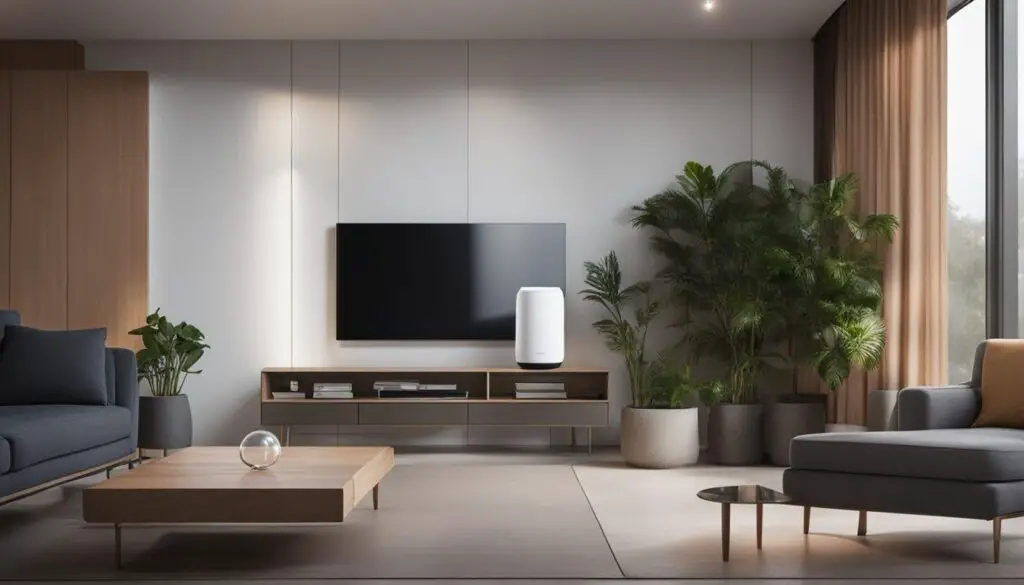
Conclusion
The integration of AI-powered smart home automation has revolutionized our homes, bringing efficiency and convenience to new heights. By harnessing the power of AI algorithms, smart devices are able to provide personalized experiences while optimizing energy usage, enhancing security, and ensuring comfort for homeowners worldwide.
Looking ahead, the future of smart home automation holds great promise. Advancements in healthcare integration will enable our homes to seamlessly monitor our well-being, while smart appliances and improved voice recognition technology will further simplify our daily routines.
As AI continues to evolve, our homes will become even more intelligent, adapting to our individual needs and improving our quality of life. Embracing this technological revolution in smart home automation guarantees greater comfort, efficiency, and peace of mind.
The future trends in AI-powered smart home automation are bright, creating a world where homes are not only smarter but also more intuitive and responsive. By embracing these innovations, we can unlock the full potential of our living spaces, creating environments that effortlessly cater to our unique preferences and requirements.
FAQ
How does smart home automation work?
Smart home automation involves integrating devices and advanced technologies into a house, connecting them to a central hub. This hub can be accessed through a smartphone or other means, allowing homeowners to automate and remotely manage tasks such as adjusting room temperature, controlling lighting, monitoring security, and optimizing energy usage.
What are some popular AI apps in smart home automation?
Some popular AI apps in smart home automation include Amazon Alexa, Google Assistant, Apple HomeKit, Samsung SmartThings, Philips Hue, Nest, Ring, Ecobee, and Tuya Smart. These apps offer a range of features and functionalities to control and automate smart devices in the home.
What are some real-life examples of AI-driven smart home automation use cases?
Real-life examples of AI-driven smart home automation use cases include voice assistants for control and automation, energy management and optimization with devices like the Nest Learning Thermostat, security and surveillance with devices like the Ring Video Doorbell and Nest Cam, predictive maintenance with devices like Whirlpool Smart Appliances, personal lighting and ambience control with devices like Philips Hue, health and wellness monitoring with devices like the Apple Watch with HealthKit, automated voice-controlled entertainment with devices like Sonos One with built-in Alexa, automating appliances and scheduling with devices like Samsung SmartThings, climate control and air quality with devices like Ecobee Smart Thermostats, and emergency response and safety with devices like the Nest Protect Smoke and Carbon Monoxide Detector.
How has AI-powered smart home automation transformed homes?
AI-powered smart home automation has transformed homes by making them more efficient and convenient. The integration of AI algorithms into smart devices allows for personalized experiences and optimization of energy usage, security, and comfort.
What does the future hold for smart home automation?
The future of smart home automation holds even more potential, with advancements in healthcare integration, smart appliances, and improved voice recognition technology. As AI continues to evolve, our homes will become even more intelligent, catering to our individual needs and enhancing our quality of life.



